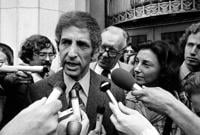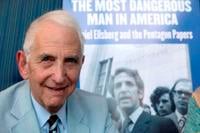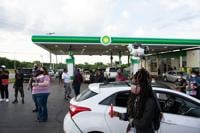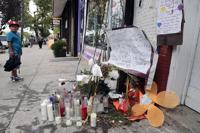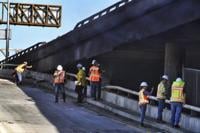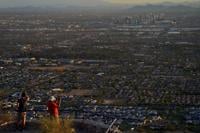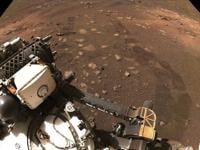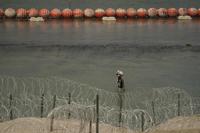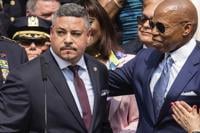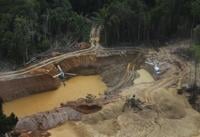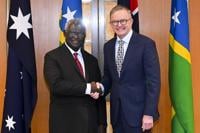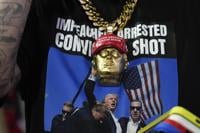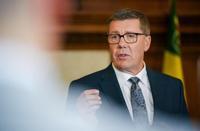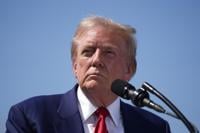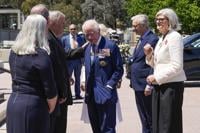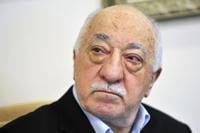NEW YORK (AP) — Daniel Ellsberg, the history-making whistleblower who by leaking the Pentagon Papers revealed longtime government doubts and deceit about the Vietnam War and inspired acts of retaliation by President Richard Nixon that helped lead to his resignation, has died. He was 92.
Ellsberg, whose actions led to a landmark First Amendment ruling by the Supreme Court, had disclosed in February that he was terminally ill with pancreatic cancer. His family announced his death Friday morning in a letter released by a spokeswoman, Julia Pacetti.
“He was not in pain, and was surrounded by loving family,” the letter reads in part. “Thank you, everyone, for your outpouring of love, appreciation and well-wishes to Dan in the previous months. It all warmed his heart at the end of his life.”
Until the early 1970s, when he disclosed that he was the source for the stunning media reports on the 47-volume, 7,000-page Defense Department study of the U.S. role in Indochina, Ellsberg was a well-placed member of the government-military elite. He was a Harvard graduate and self-defined “cold warrior” who served as a private and government consultant on Vietnam throughout the 1960s, risked his life on the battlefield, received the highest security clearances and came to be trusted by officials in Democratic and Republican administrations.
He was especially valued, he would later note, for his “talent for discretion.”
But like millions of other Americans, in and out of government, he had turned against the yearslong war in Vietnam, the government’s claims that the battle was winnable and that a victory for the North Vietnamese over the U.S.-backed South would lead to the spread of communism throughout the region. Unlike so many other war opponents, he was in a special position to make a difference.
“An entire generation of Vietnam-era insiders had become just as disillusioned as I with a war they saw as hopeless and interminable,” he wrote in his 2002 memoir, “Secrets: A Memoir of Vietnam and the Pentagon Papers.” “By 1968, if not earlier, they all wanted, as I did, to see us out of this war.”
The Pentagon Papers had been commissioned in 1967 by then-Defense Secretary Robert S. McNamara, a leading public advocate of the war who wanted to leave behind a comprehensive history of the U.S. and Vietnam and to help his successors avoid the kinds of mistakes he would only admit to long after. The papers covered more than 20 years, from France’s failed efforts at colonization in the 1940s and 1950s to the growing involvement of the U.S., including the bombing raids and deployment of hundreds of thousands of ground troops during Lyndon Johnson’s administration. Ellsberg was among those asked to work on the study, focusing on 1961, when the newly-elected President John F. Kennedy began adding advisers and support units.
As much as anyone, Ellsberg embodied the individual of conscience — who answered only to his sense of right and wrong, even if the price was his own freedom. David Halberstam, the late author and Vietnam War correspondent who had known Ellsberg since both were posted overseas, would describe him as no ordinary convert. He was highly intelligent, obsessively curious and profoundly sensitive, a born proselytizer who “saw political events in terms of moral absolutes” and demanded consequences for abuses of power.
As much as anyone, Ellsberg also embodied the fall of American idealism in foreign policy in the 1960s and 1970s and the upending of the post-World War II consensus that Communism, real or suspected, should be opposed worldwide.
The Pentagon Papers were first published in The New York Times in June 1971, with The Washington Post, The Associated Press and more than a dozen others following. They documented that the U.S. had defied a 1954 settlement barring a foreign military presence in Vietnam, questioned whether South Vietnam had a viable government, secretly expanded the war to neighboring countries and had plotted to send American soldiers even as Johnson vowed he wouldn’t.
The Johnson administration had dramatically and covertly escalated the war despite the “judgment of the Government’s intelligence community that the measures would not” weaken the North Vietnamese, wrote the Times’ Neil Sheehan, a former Vietnam correspondent who later wrote a Pulitzer Prize winning book on the war, “A Bright Shining Lie.”
The leaker’s identity became a national guessing game and Ellsberg proved an obvious suspect, because of his access to the papers and his public condemnation of the war over the previous two years. With the FBI in pursuit, Ellsberg turned himself in to authorities in Boston, became a hero to the antiwar movement and a traitor to the war’s supporters, labeled the “most dangerous man in America” by ��ɫֱ�� Security Adviser Henry Kissinger, with whom Ellsberg had once been friendly.
The papers themselves were seen by many as an indictment not just of a given president or party, but of a generation of political leadership. The historian and philosopher Hannah Arendt would note that growing mistrust of the government during the Vietnam era, “the credibility gap,” had “opened into an abyss.”
“The quicksand of lying statements of all sorts, deceptions as well as self-deceptions, is apt to engulf any reader who wishes to probe this material, which, unhappily, he must recognize as the infrastructure of nearly a decade of United States foreign and domestic policy,” she wrote.
The Nixon administration quickly tried to block further publication on the grounds that the papers would compromise national security, but the U.S. Supreme Court ruled 6-3 in favor of the newspapers on June 30, 1971, a major First Amendment ruling rejecting prior restraint. Nixon himself, initially unconcerned because the papers predated his time in office, was determined to punish Ellsberg and formed a renegade team of White House “plumbers,” endowed with a stash of White House “hush money” and the mission of preventing future leaks.
“You can’t drop it,” Nixon fumed privately to his chief of staff, H.R. Haldeman. “You can’t let the Jew steal that stuff and get away with it. You understand?”
Ellsberg faced trials in Boston and Los Angeles on federal charges for espionage and theft, with a possible sentence of more than 100 years. He had expected to go to jail, but was spared, in part, by Nixon’s rage and the excesses of those around him. The Boston case ended in a mistrial because the government wiretapped conversations between a defense witness and his attorney. Charges in the Los Angeles trial were dismissed after Judge Matthew Byrne learned that White House “plumbers” G. Gordon Liddy and E. Howard Hunt had burglarized the office of Ellsberg’s psychiatrist in Beverly Hills, California.
Byrne ruled that “the bizarre events have incurably infected the prosecution of this case.”
Meanwhile, the “plumbers” continued their crime wave, notably the June 1972 break-in of the Democratic Party’s national headquarters, at the Watergate Hotel in Washington, D.C. The Watergate scandal didn’t prevent Nixon from a landslide reelection in 1972, but would expand rapidly during his second term and culminate in his resignation in August 1974. U.S. combat troops had already left Vietnam and the North Vietnamese captured the Southern capital, Saigon, in April 1975.
“Without Nixon’s obsession with me, he would have stayed in office,” Ellsberg told The Associated Press in 1999. “And had he not been removed from office, he would have continued the bombing (in Vietnam).”
Ellsberg’s story was depicted in the 2009 documentary “The Most Dangerous Man in America: Daniel Ellsberg and the Pentagon Papers.” The movie had its West Coast premiere only a few blocks from the Rand Corp. headquarters in Santa Monica, Ellsberg former workplace. He sent college students with fliers to urge old colleagues to attend the screening, but none attended.
Ellsberg was born in Chicago in 1931, to Jewish parents who converted to Christian Science. His father was an unemployed engineer in the early years of the Great Depression and the family later moved to suburban Detroit, where his father worked in a plant making B-24 bombers. Daniel held vivid memories of learning that the Japanese had bombed Pearl Harbor in 1941, and of reports of the Nazis bombing London and the U.S. bombing Germany and Japan.
In his teens, Ellsberg found himself in agreement with Harry Truman and other “Cold War liberals,” believing in civil rights and economic justice at home, and containing the Soviet Union overseas. He was also shaped profoundly by personal tragedy. During a car trip in 1946, his father nodded off at the wheel and crashed into a sidewall, killing Ellsberg’s mother and younger sister. Ellsberg would look back with a sense of loss and mistrust — his father, the authority figure, had failed to keep his family safe.
With thoughts of becoming a labor organizer, Ellsberg won a scholarship to Harvard University and graduated summa cum laude. He served in the Marines as an act of defiance against his Ivy League background, but eventually returned to Harvard and earned a doctorate in economics. In 1959, he became a strategic analyst at the Rand Corp., a global policy think tank based in Santa Monica, California, and consulted for the Defense Department and the White House on nuclear weapons, nuclear war plans and crisis decision-making. Ellsberg spent two years in the mid-1960s with the State Department in Vietnam, where he learned first-hand how casually military and political officials lied and became convinced the conflict was unwinnable, in part through the firefights with the North Vietnamese that he survived.
Encouraged by a close friend from Rand, researcher Anthony J. Russo, Ellsberg had decided by the fall of 1969 that the Nixon administration would continue the policies of other presidents and that the McNamara study needed to be seen. His life would soon resemble an espionage thriller.
Ellsberg removed some of the bound, classified volumes from his safe in the Rand offices, placed them in his briefcase and walked past security guards and a sign reading “Loose Lips Sink Ships.” With Russo’s girlfriend owning an advertising agency, Ellsberg spent months copying the documents on an office Xerox machine, sometimes helped by his teenage son Robert. On occasion, the office alarm would mistakenly ring, police would show up, and leave soon after. Ellsberg became so worried that he began slicing off the “Top Secret” markings from the papers, in case authorities wanted to inspect more closely.
Leaking to the Times was not his first choice. He had hoped that government officials, including Kissinger, would read the study and realize the war was hopeless. Legislators turning him down included Sen. William J. Fulbright of Arkansas, the longtime chairman of the Foreign Relations Committee, and Sen. George McGovern of South Dakota, who in 1972 would run for president as an antiwar candidate.
A final plot twist was unknown to Ellsberg until decades later. He had showed some of the report to Marcus Raskin and Ralph Stavins of the liberal think tank the Institute for Policy Studies before approaching Sheehan. Only in the early 2000s did he learn that Raskin and Stavins, who had recommended that he speak with Sheehan, had already given some of the papers to the Times reporter. Sheehan, who died in 2021, also defied Ellsberg’s request not to make duplicate copies and did not give him advance notice before the first Times report ran.
“It was just luck that he didn’t get the whistle blown on the whole damn thing,” Sheehan later said of Ellsberg, whom he regarded as “out of control.”
In his later years, a spry, silver-haired Ellsberg became a prominent free speech and anti-Iraq war activist, drawing parallels between U.S. involvement in Iraq and Vietnam, and called for impeachment of President George W. Bush. He expressed similar fears about Afghanistan during the Obama administration, saying it had the potential to become “Vietnamistan” if the U.S. increased troops there.
He was active in campaigns to prevent nuclear arms proliferation and drew upon his history in government for the 2017 book “The Doomsday Machine: Confessions of a Nuclear War Planner,” in which he included a once-top secret document showing that the U.S. had considered launching nuclear attacks on the Chinese in 1958. He also defended , among them WikiLeaks founder Julian Assange, former Army intelligence analyst Chelsea Manning and Edward Snowden, the government contractor who disclosed details of secret U.S. surveillance programs and is now living in Russia.
“Many of the people whistle-blowers work with know the same things and actually regard the information in the same way — that it’s wrong — but they keep their mouths shut,” Ellsberg told The New York Times in 2023.
On Friday, Snowden tweeted that he had spoken with Ellsberg last month and found him more concerned about the world's fate than about his own.
“He assessed the risk of a nuclear exchange to be escalating beyond 10%,” Snowden wrote. “He had hoped to dedicate his final hours to reducing it, for all those he would leave behind. A hero to the end.”
Ellsberg is survived by his second wife, the journalist Patricia Marx, and three children, two from his first marriage. He and Marx wedded in 1970, the year before the Pentagon Papers were made public. In a New York Times wedding announcement, he was identified as a “senior research fellow at the Massachusetts Institute of Technology’s Center for International Studies, where he was writing a critical study of United States involvement in Vietnam.”
___
Associated Press reporters Eric Tucker and Nomaan Merchant in Washington, D.C., contributed to this story, which includes biographical material compiled by former AP reporter Louise Chu.
___
Online:


